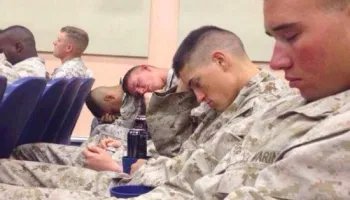This is the third essay in a five-part series. To read the previous piece, see here.
Food
And we’ve come to starvation. Healthy, athletic male college freshmen in industrialized countries tend not to weigh 113 pounds. They also tend not to drop 27 pounds from their healthy, athletic norms over three weeks. So, how did we get here? That warrants a discussion about West Point’s food (or lack thereof) because, quite simply, they didn’t let me eat.
All our in-barracks meals followed the same rhythm. The nine New Cadets in my squad lined up at parade rest behind our seats with our squad leader at the head of the table. If a West Point graduate had been killed, we would observe a moment of silence. This was a solemn, almost holy experience. Everything would stop. No murmurs between cadre. No clanging utensils or moving chairs. It seemed the entire world stopped out of respect for the fallen Cadet. This happened more and more frequently throughout my tenure at West Point, sometimes at multiple meals in a day.
A booming “Take! Seats!” echoed from the speakers down the yawning gothic mess hall. 1,000 wooden chairs simultaneously grated on the granite floor as 1,000 nervous New Cadets did what we were told.
Upon sitting, I measured my posture to be exactly a fist’s-distance from the back of the chair (no reclining!) while my stomach remained a fist’s distance from the table. My plate was exactly a thumb’s distance from the edge of the table. I could not speak or shift my eyes from the small West Point crest at the top of my plate. Failing to follow any of these rules would catalyze a sharp reprimand and punishment from my squad leader.
The next fifteen minutes of the 25-minute meal were dedicated to hazing. The squad leader could ask us to individually or collectively recite any page of the Knowledge Book verbatim. Failure to do this would result in yelling, pushups, or other disciplinary measures. When it was all said and done—if we were lucky—we might have 10 minutes left to eat. But you’ve got something else coming if you thought we’d just dig in.
Oooooooh no, friend. Behold the Army’s finely-honed order of operations for how West Point New Cadets should ingest their food! First, fold the napkin and place it on your lap with the fold facing your torso. Next, set your knife diagonally in the upper-right-hand quadrant of the plate with the edge facing inward. The fork must lay parallel and inside the knife with its points facing down.
Grab the fork and knife with both hands, cut the desired piece of food, place the knife back in the upper right-hand quadrant, switch the fork to your dominant hand, put the food in your mouth, place the fork parallel to and inside the knife with the points down, place both hands on your lap, and—this part is critical—chew three to five times before swallowing.
That last bit might have thrown you off. Surely, no one is counting your chews, right? WRONG!
The squad leader literally counted our chews. Every. Single. One. You might fool them a few times, but they’ll catch on, and when they yell, “New Cadet, swallow!” you’d better fucking swallow like your life depends on it, even if your life quite literally depends on your ability to choke down a half-chewed piece of chicken without asphyxiating. And remember, you can’t speak, you can’t shift your eyes, and you can NEVER, ever, ever, ever let any speck of food land on that crest at the top of your plate.
Sometimes, if we’d done something extraordinary as a squad like win a companywide competition, we might be granted “big bites,” which meant we were allotted the truly lavish privilege of chewing our food as we pleased like aristocrats or something.
It’s quite a wonder I lost so much weight in such a short period. Burning 3,000 to 4,000 calories a day while only eating handfuls of food per meal is the ultimate influencer diet doctors hate. Beyond its unparalleled efficiency at shedding pounds and making you sick, starvation does other weird things to your body and psyche. I got really, instinctively good at identifying and prioritizing the most calorie-dense foods available, no matter the circumstance.
I once found myself in the middle of a forest during a field exercise trying to spread a packet of peanut butter on a cracker that served as my lunch. This was made somewhat difficult by an ungodly downpour bucketing around me. While I hunched over my cracker in a half-successful attempt to block the rain with my back, it slipped from my hand and fell, peanut butter down, onto the mud. I didn’t hesitate a millisecond before grabbing that peanut butter and muck open-faced sandwich and cramming it down my pie hole.
This brings me to the topic of meals ready to eat (MRE). These packets of ultra-processed food contained up to 1,500 calories apiece, could last five years in storage, and were our main source of sustenance in the field. Everything therein was packaged in plastic sleeves. A chemical pad activated when in contact with water, allowing us to warm those sleeves. Fun fact, they could also create a poor man’s tear gas when mixed with tabasco.
I often didn’t bother heating my food on account of the starvation, as my primary concern was ingesting as many calories as quickly as possible. Nevertheless, in terms of flavor, beef ravioli and cheese tortellini were the best options. Spaghetti with meat sauce, beef stew, and Thai chicken were decent. God help you, though, if you were stuck with veggie omelet, beef patty, or veggie burger.
Just because everything inside an MRE technically contained calories doesn’t mean it could all be ethically described as fit for human consumption. The malt shakes, which came in powder form and had to be combined with water, had the consistency and flavor of chalk mixed with a crushed strawberry Tums. On the opposite end of the spectrum, the pound cakes were worth their weight in gold. You could sometimes trade an entire cheese tortellini for a pumpkin pound cake.
There was a single ironclad rule when it came to MREs: you categorically did not, could not, upon pain of death, eat the Charms. Not even if you weren’t merely starving, but actually starving to death, not even then were you allowed to open the small bag of rock candy and pop one into your mouth because, when you ate the Charms, it rained. And when it rained, your soaked, surly classmates and cadre would go looking for someone who ate the Charms. And when they found someone who ate the Charms, they hazed the shit out of that person because they made it rain. It was flawless circular Army reasoning that made perfect nonsense, but it was real—certainly the consequences were—so you didn’t eat the fucking Charms.
Sleep
It was desperately sought and never found in sufficient quantities. The word “tired” does not do justice to the crushing exhaustion I felt during Beast. Getting five to six hours of sleep a night was considered pretty good.
As a result, I fell asleep EVERYWHERE. The second my eyes closed, bang! I was out. I sometimes fell asleep in formation. The thing about sleeping while upright is that you don’t realize it until you start falling. I always caught myself and shot furtive glances up and down formation to check if the cadre had seen me briefly step out of line. However, some of my classmates woke up past the point of no return and fell right on their faces.
It was lights out as soon as I was ordered into the prone position. Laying on my stomach with a rifle in my arms, I’d place my cheek on the buttstock, my helmet against the rear sight, and I was off to dreamland. The best part about this position was that the cadre would have no idea I was asleep unless they squatted down and physically lifted my rifle to see my closed eyes.
I’d sometimes sneak to the bathroom, lock the stall, sit on the toilet, set an alarm on my watch for five minutes, cross my arms, lean against the wall, and off I went.
In the barracks, poor, long-suffering Jerry had to deal with my unintended shenanigans. I’d bolt upright in the middle of the night, convinced we were late to formation, and yell at him that we had to go now! Jerry would scramble awake as I ran about in a panic, pull on his uniform, glance at his watch, and sigh.
“We have another two hours before wake up call,” he’d announce before rolling back into his sheets. “Go to sleep.”
This happened more times than I’d like to admit. Eventually, Jerry just ignored me completely until his alarm went off.
At first, we’d sleep in our boxers under the covers, but this entailed making our beds and donning uniforms in the morning, eating away at the few furtive minutes we had before getting on the wall. Eventually, we slept fully dressed on top of our sheets. Our alarms sounded 15 minutes before the cadre even came by—plenty of time to brush our teeth, shave, clean the sink, make last-minute spot checks around the room, and amble onto the wall without getting hazed.
Sleep in the field was a very different proposition. The best-case scenario entailed being in a small tent in which two people could somewhat comfortably lay down their half-inch-thick foam mats and gear. The tents did a decent job of blocking the rain and keeping us warm at night. Next best was being granted permission to string up a tarp above our mats as we slept in the woods. Throughout the night, a constant series of percussive pings would bounce off the tarp—a combination of twigs, acorns, and caterpillar shit falling from the branches above.
If we couldn’t set up a tarp, all that debris would fall on our faces. In the worst-case scenario, when we weren’t even allowed to unroll the mats, we just slept on the forest floor. Thing is, the ground is part of an enormous planet that gets much colder than you at night, and so sucks all the warmth right out of your body so that you wake up shaking like a leaf. This was made worse, as all things are, when it rained. Some people could snooze right through a downpour, but the constant dripping made it so I could only snatch brief intervals of sleep.
Sleeping in the field meant accepting the fact that bugs were the real kings of the forest. Any random patch of ground could be crawling with hundreds of ants, ticks, spiders, daddy long legs, and assorted other insects. I’d feel them the entire night, scrambling over my arms, legs, and face. That’s why we tucked our pant legs into our socks and shirts into our waists. We also buttoned up our collars, closed our cuffs, and thoroughly checked our boots in the morning to see what snuck in. Failure to follow these procedures was why one of my classmates was bitten by a brown recluse whose necro-toxin created a hole the size of a quarter in his abdomen that allowed us to peer right into his body cavity.
Singing Cadence
Almost every time we marched or ran in formation, we sang cadence, which simply meant stepping to the beat of a call and response song. This was my favorite:
You can’t ride in my little red wagon!
(You can’t ride in my little red wagon!)
The back seat’s broken and the axel’s draggin’!
(The back seat’s broken and the axel’s draggin’!)
I said you can’t ride in my little red wagon!
(You can’t ride in my little red wagon!)
The back seat’s broken and the axel’s draggin’!
(The back seat’s broken and the axel’s draggin’!)
Second verse!
(Second verse!)
Same as the first!
(Same as the first!)
(Whispers) But a little bit softer and a little less worse!
(Whispers) (But a little bit softer and a little less worse!)
(Whispers) You can’t ride in my little red wagon!
(Whispers) (You can’t ride in my little red wagon!)
(Whispers) The back seat’s broken and the axel’s draggin’!
(Whispers) (The back seat’s broken and the axel’s draggin’!)
(Whispers) I said you can’t ride in my little red wagon!
(Whispers) (You can’t ride in my little red wagon!)
(Whispers) The back seat’s broken and the axel’s draggin’!
(Whispers) (The back seat’s broken and the axel’s draggin’!)
Third verse!
(Third verse!)
Same as the first!
(Same as the first!)
(Shouts) But a whole lot louder and a whole lot worse!
(Shouts) (But a whole lot louder and a whole lot worse!)
(Shouts) You can’t ride in my little red wagon!
(Shouts) (You can’t ride in my little red wagon!)
(Shouts) The back seat’s broken and the axel’s draggin’!
(Shouts) (The back seat’s broken and the axel’s draggin’!)
(Shouts) I said you can’t ride in my little red wagon!
(Shouts) (You can’t ride in my little red wagon!)
(Shouts) The back seat’s broken and the axel’s draggin’!
(Shouts) (The back seat’s broken and the axel’s draggin’!)
When singing cadence, regardless if you’re from New Jersey, California, Ontario, or Mozambique, you will sing it in a Southern drawl straight out of Macon, Georgia. It’s wild. Black, Asian, Latino, Arab, whatever, it doesn’t matter. The second Little Red Wagon starts, you transform into Foghorn Leghorn.
Washouts
Every day, Jerry and I watched as handfuls of former New Cadets walked across the plaza outside our window, carrying their civilian bags, laughing, joking. It was surreal. Just a few days prior, they had been like us: stressed, hungry, exhausted New Cadets. Now they looked like… people? Even more disconcerting, they looked happy.
These were the washouts, the people who quit. I’d join their ranks two years later after a whoooooole lot more shit. Folks quit all the time during Beast. Supposedly 100 did so on the first day. They also quit in the barracks. They quit in the field. They quit in the middle of a meal after jumping to their feet and letting the cadre know exactly what they thought about them. At these times, my squad leader would growl menacingly that we’d all better keep our traps shut and not dare divert our eyes from the crests on our plates.
Others were medically discharged after sustaining serious injuries like fractured femurs, torn ligaments, and herniated disks. People fell down cliffs, were crushed by transpo trucks, or suffered terrible infections. Occasionally, somebody would be accidentally shot on the firing range or take a ricochet to the dome.
Psychological discharges were relatively common. Guys broke all the time, like my friend who ran into the woods. Unfortunately, the stress could also have darker consequences. One New Cadet stabbed himself in the thigh with a pocket knife because he couldn’t handle the stress. They could also take the ultimate route out, like jumping from the top of Eisenhower Hall.
. . . . .
This is the third of a five-part series of essays recounting my experience during West Point’s Cadet Basic Training. The other articles will be published in subsequent weeks.
If you like our stories, check out The Miami Creation Myth hardcover.




